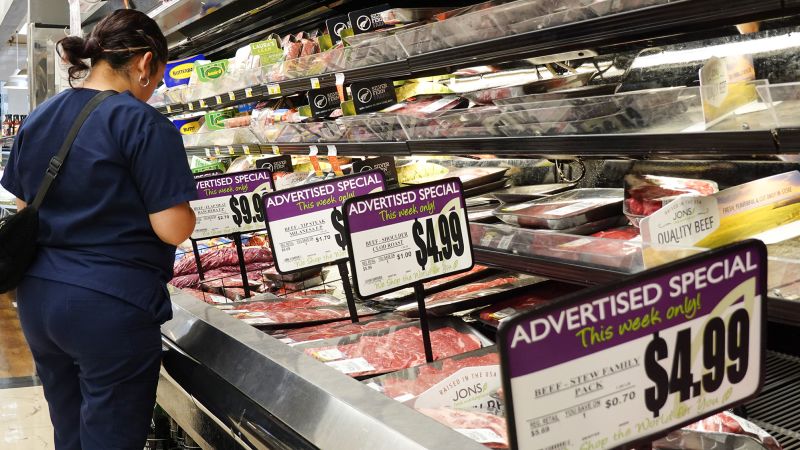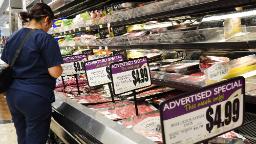

A version of this story appears in CNN’s What Matters newsletter. To get it in your inbox, sign up for free here.
CNN
—
Life is more expensive, which means everyone has gotten a pay cut. And people are not happy about it.
Still-high gas prices. High rents. The cost of service. It’s all having a cumulative effect. And wage hikes haven’t kept pace with inflation.
$1,000 for a day at Disney. A more specific example that affects people fortunate enough to consider a vacation is the fact that a family of four will now spend more than $1,000 for a single day parking their car and park hopping at Disneyland. And that’s before food or souvenirs, according to CNN’s Natasha Chen.
Tide turning. Aggravating and persistent inflation that refuses, so far, to be tamed by interest rate hikes, remains a motivating force in American politics. And the sour economic mood is tilting the political landscape toward Republicans, according to CNN polling director Jennifer Agiesta.
“The nation’s overall political mood – which had been somewhat more favorable for Democrats following the Supreme Court’s overturning of Roe v. Wade – may be tilting more in Republicans’ favor,” Agiesta writes.
What would Republicans do? It’s worth considering how the economy will be different with Republicans in charge of the House or Senate.
Republicans on the campaign trail have tried to capitalize on the ongoing sticker shock and laid primary blame for inflation on government spending, an argument that overlooks the energy spike caused by Russia’s war on Ukraine and the supply chain issues caused by the lingering Covid-19 pandemic.
Here’s an extended riff from Minority Leader Kevin McCarthy – who is in line to be speaker of the House next year if Republicans win in November – when he appeared on Fox on Tuesday:
“Every American needs to be asked this one question: ‘Could you afford to give up one month of your wages?’ Ninety-five percent of Americans will say no. But that’s what the Democrats have taken from you. Because one month of your wages is 8.3% of your overall year – inflation is higher than that.
That’s why when you go to the store, eggs are higher. You‘ve got milk higher, your gasoline prices higher. It is the Democrat policies that brought that. That’s why in the Commitment to America, we will be energy independent, that lower your prices. We’ll take away this runaway spending. We’ll make America more productive to curve inflation, what the Democrats have brought us.”
Controlling the House and/or Senate would certainly give Republicans the ability to squash any more spending pushed by the Biden administration. And for an idea of what they support, check out McCarthy’s Commitment to America website. It contains few specifics, but has three basic tenets:
- “Curb wasteful government spending …”
- Enact “pro-growth tax and deregulatory policies …” (cut taxes and regulations)
- “Make America energy independent …” (specifically through oil and gas production)
Regarding the tax and regulation ideas, those are longer-term ideas since they would require a Republican president.
A fourth promise to end reliance on China and ease supply chain problems does not include specific policy ideas.
President Joe Biden, for his part, has partially wrapped independence from China and building up US manufacturing into his climate policy, and on Wednesday announced $2.8 billion in grants for US battery supply chains under authority from the bipartisan infrastructure law that passed last year.
McCarthy has suggested Republicans will go further and even use the debt ceiling, which will likely be reached early next year, as leverage to force spending cuts. It’s a more overt endorsement of the tactic, which would theoretically see the US default on its obligations.
For an assessment of what Republicans can and would be able to accomplish on inflation, I talked to Douglas Holtz-Eakin, an economist and president of the American Action Forum, a nonprofit organization that does not endorse policy positions but has a center-right viewpoint. He’s a former director of the Congressional Budget Office and was the economic policy adviser to Sen. John McCain’s 2008 presidential campaign, but he’s not affiliated with either party.
The first thing to know, Holtz-Eakin said, is that the primary job of controlling inflation belongs to the Federal Reserve, not Congress or the White House.
However, he’s of the opinion – along with other economists like the Democrat Larry Summers – that government spending, and in particular the American Rescue Plan Act passed without help from Republicans shortly after Biden took office, helped drive inflation.
“Not committing the same mistake is something Republicans can control, there’s no doubt about it,” he said. “They can block things if they control the House, and that would be beneficial” to curb spending.
While Holtz-Eakin said it is not accurate to say Biden and Democrats created the inflation, they certainly helped accelerate it.
“It’s quite clear in the data that there’s a sharp ramp up of inflation in April of 2021 immediately as the checks go out, to implement a $2 trillion stimulus in our economy,” he said.
“We’ve seen this movie a million times before,” Holtz-Eakin said, rattling off various ideas that have been put forward to control deficit spending and the national debt.
“People have talked on both sides of this forever, and there hasn’t been one difference in the outcomes,” he said. The debt has gone up steadily. It is currently set at nearly $31.4 trillion. At some point, he argued, someone is going to have to get serious about making fiscal policy more sustainable.
While the American Rescue Plan never would have happened if Republicans had been in control of the House, Holtz-Eakin also said something important about how even when there are promises to cut spending, spending occurs.
“On the whole, Congress tends to spend more and tax less and run deficits,” he said. “On the whole, it’s directionally always more inflationary than not.” But a GOP majority would certainly lower the magnitude of spending, he said.
There are more and more predictions of a recession as the Federal Reserve tries to tamp down on inflation by raising interest rates.
“Once inflation is there, you have nothing but bad choices,” Holtz-Eakin said. “You have to raise rates and tighten financial conditions. That means fewer jobs and less retail sales, fewer housing starts and all sorts of bad decisions.”
Those decisions are being made regardless of who sits in the House and Senate.
“Ownership of the economy usually falls to the president, who gets blamed or gets credit for what happens on his or her watch,” he said.
The President tried again Wednesday to put even the smallest dent in gas prices with the formal announcement of yet another release from the Strategic Petroleum Reserve – 15 million barrels in December – although it’s unlikely to have much impact.
The rest of the government is trying to do its part to ease the burden of inflation too:
That said, none of those measures will likely make Americans feel very different about the economy before Election Day.
